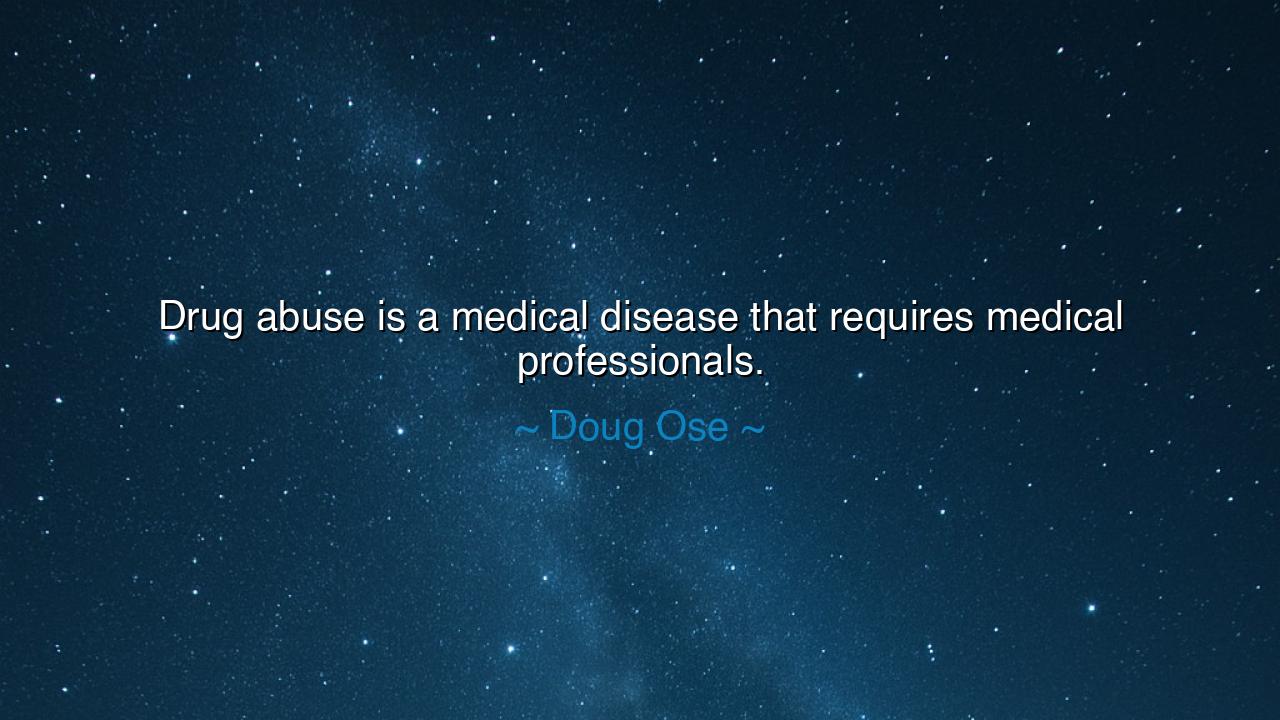
Drug abuse is a medical disease that requires medical






In the words of Doug Ose, there echoes a truth both compassionate and courageous: “Drug abuse is a medical disease that requires medical professionals.” Though simple in form, these words pierce the fog of misunderstanding that has long shrouded human suffering. They remind us that the battle against addiction is not one of judgment, but of healing; not of punishment, but of mercy. Ose’s declaration is a call to wisdom — that we must see the afflicted not as sinners to be condemned, but as patients to be treated, brothers and sisters to be restored to wholeness.
In the days of old, when pestilence or madness struck the villages, the healers did not scorn the sick. They gathered herbs, whispered prayers, and sought to draw the poison from body and soul. Yet in our modern age, where the mind’s sickness hides behind the veil of addiction, too many have forgotten that compassion is also medicine. Drug abuse, Ose tells us, is not a failure of character, but a disease — a shadow that takes hold of the body and rewires the spirit. To fight it, we must call upon the wisdom of healers, not the wrath of judges.
The origin of this truth lies in centuries of human struggle — from the opium dens of ancient China to the crack epidemics of the modern world. In each age, societies have sought to control addiction with chains, with exile, with shame. Yet the problem has never been conquered by fear. It was only when physicians, scientists, and those with empathy began to understand addiction as a condition of the brain — as a medical affliction — that the light of hope began to dawn. Doug Ose’s words are rooted in this awakening: a reminder that only knowledge and care can free what cruelty cannot.
Let us remember the story of Dr. John Pemberton, a wounded veteran of the American Civil War. Addicted to morphine after his injuries, he sought a cure and created what would become Coca-Cola — not as a soft drink, but as a medicinal tonic to ease his pain. His struggle was that of millions — to escape dependence while craving relief. His story is both tragedy and revelation: for it shows that addiction grows not from wickedness, but from wounds — wounds physical, emotional, and spiritual. And as all wounds demand healers, so too does this one require the medical hands of understanding.
In Ose’s words there is also a plea — a call to society to shift its gaze from condemnation to compassion. For too long, the addict has been cast aside, branded as weak, as criminal, as lost beyond redemption. Yet every person enslaved by a substance once sought comfort, once sought relief, once sought peace. The tragedy lies not in their fall, but in our refusal to extend a hand. The true civilization is not measured by its wealth or armies, but by its mercy. To see the diseased as diseased, and to heal them — that is the mark of progress.
The lesson here, passed down through generations, is this: understand before you judge. When you encounter one trapped in the grasp of addiction, remember that beneath the chaos lives a human being in pain. As the ancients said, “The physician must first heal the soul before the body.” Offer kindness where the world offers contempt. Encourage treatment where others demand punishment. For in doing so, you become not merely a bystander to healing, but a participant in it — a modern-day healer in your own right.
Practical wisdom flows from this truth. Support those who seek help, not by pity but by patience. Advocate for medical intervention, for therapy, for education — for these are the tools that can mend both the brain and the heart. And if your own path has wandered near the shadow of addiction, remember this: you are not your disease. Seek those trained to heal, for recovery is not a myth but a discipline, forged by science and sustained by hope.
So let these words of Doug Ose stand as a beacon to all generations: that drug abuse is a medical disease that requires medical professionals. May they remind us that compassion is the highest form of wisdom, and healing the noblest form of strength. For when we choose to see the suffering not as broken souls but as patients yearning for light, we not only restore their lives — we restore our own humanity.






AAdministratorAdministrator
Welcome, honored guests. Please leave a comment, we will respond soon